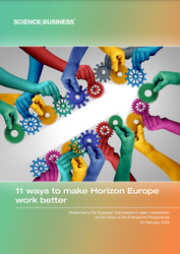A Science|Business response to the European Commission’s open consultation on the future of the Framework Programme
Get your free copy

Now and throughout 2023, the European Commission is making its big, periodic push to revise its long-term research and innovation agenda, as implemented in the €95.5 billion Horizon Europe programme. It does so against the backdrop of a series of shockwaves which have buffeted the continent – from COVID, heatwaves and drought to energy and food supply disruption caused by the Ukraine war – and which have underlined both the importance and fragility of Europe’s ambitions for sustainable development, climate neutrality, inclusive growth and more. The programme, as it aims to tackle these challenges, must work for Europe’s researchers and innovators as well as for society at large.
This white paper, following a series of workshops and conference sessions of the Science|Business Network on 6-7 February, is submitted to the Commission as part of its large-scale public consultation on past, present and future R&I framework programmes. In general, what we heard in these meetings was broad support for what Horizon Europe does and, by and large, how it does it. But many recommendations were also gathered about ways to improve the second half of Horizon Europe and shape the next framework programme.
This report focuses on those recommendations which appeared to us as most constructive and noteworthy.
Science|Business, a Brussels-based media and communications company focused on R&D policy, offers this summary – to the Commission’s consultation process and as well as for open-access publication – in its continuing efforts to stir informed debate, and bring attention to good ideas.
The recommendations, in brief:
- Pilot smaller scale R&I actions involving fewer partners and covering a wider range of technology readiness levels (TRLs) to enable more universities and smaller entities to participate in and lead projects in Horizon’s Pillar II, the programme’s central, collaborative research chapter.
- Communicate openly and clearly about the politics of Horizon Europe association and third country participation. To help researchers understand the political landscape better, set up a European support office or help desk, designed after similar national Horizon ‘portals’
- Slow down the roll-out of lump sum funding and produce a robust objective report on the pros and cons of the approach before going further
- Basic research should not be limited to the European Research Council and its bottom-up approach. Introduce more funding opportunities for lower TRL projects, including collaborative basic research, to Pillar II of Horizon Europe
- Research infrastructures rest on talent. Pilot a Marie Skłodowska-Curie Actions (MSCA) scheme for movement and knowledge-sharing between engineers and specialists working on research infrastructures and technology
- To meet green innovation ambitions, fund more high-risk, high-reward technologies, including further exploration of genetic modification, and give a stronger mandate to social sciences and humanities researchers
- Digital is confusing. Explain interlinkages and differences between Digital Europe, Horizon Europe, the Missions, and other instruments. And make sure different interpretations of EU data laws are not getting in the way of cross-border research and innovation
- Disease prevention won’t fix all health issues. Return focus on new therapies and disease pathways
- The Missions, five goal-oriented R&I initiatives in Horizon, need a rethink to ensure maximum impact. Pilot a mechanism to keep national agencies and researchers in the loop. Make the difference between Mission and non-Mission calls more obvious
- Ease the path of involvement in Pillar III, focused on innovation and ecosystems, for universities, and get serious about social innovation
- Instruments in the Widening programme, focused on integrating eastern and western EU members for R&I collaboration, must enable Widening countries to participate in the rest of the programme, not just give them extra space to play in. Assess what works and what doesn’t before introducing new instruments

 A unique international forum for public research organisations and companies to connect their external engagement with strategic interests around their R&D system.
A unique international forum for public research organisations and companies to connect their external engagement with strategic interests around their R&D system.